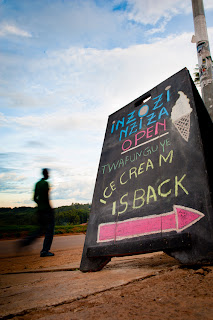The Fox (short film), and an interview with director Tony Burke
"A lonely God-fearing spinster makes the bizarre choice to join a fox in her garden having been woken by its eerie mating calls in the dead of night."
This ear-perking synopsis caught my attention recently, and upon viewing the short film above, The Fox proved to be about more than a woman who puts on some fur and goes out into the dark. The element of escapism in the film, the coldness, and the beautiful, wandering piano come together to create a very dreamlike and strange atmosphere.
The Fox is Tony Burke's first short film. He manages his own advertising and film company, Dead Bird, based in London. In the Raindance article "Let's Make This Short", Tony gives the lowdown on how he decided to take on this independent project, and what steps he took to get it done (a particularly great piece if you plan on making your first short).
I had some other pressing questions, which he was cool enough to answer via mailterview.
Celeste Ramos: The Fox has such a curious setup. We come into the film at a very “pregnant moment” from the start. I got the feeling something had just happened, and the woman is reacting to it, and it’s in that charged atmosphere that the fox's heat connects with what the woman is going through. I felt like there was some kind of a renouncing of religion with her merging of human and animal. It’s a situation that drew me in very quickly, and there's an air of mischief and intrigue. Where did the idea for the film come from? What would you say the woman represents?
Tony Burke: The idea very simply came from me lying awake listening to the foxes outside. They have such a mysterious, almost supernatural presence and sound, and when darkness falls our world becomes theirs. It just set me thinking, what if a human being entered their nocturnal world? So I created this woman, haunted by loneliness and grief and regret. Suppressed by religion. Unfulfilled and sexually dormant. And the foxes wake her up and call her outside and force her to make a choice. Do what’s right for her, or do what’s right according to her faith? So the woman basically represents the choice we all face everyday. Do what we think is right, or do what we feel is right regardless of the rules.
CR: What was your own journey like in the making of the film? In your article, you mentioned that when the idea came to mind and you had it written down, and everything fit neatly on a piece of paper. But was it a tough or particularly symbolic undertaking for you? Did you find that your time in advertising and as a generally creative person aided you through it completely, or were there other skills (apart from learning Direction) that you suddenly had to learn and call upon in the process?
TB: It was a great leap for me. I didn’t see myself as a director or a filmmaker. Nor did I did I enter into this to become a director or a filmmaker. It was a personal challenge and an experiment. I’ve always written and I wanted to create something from scratch, and match a vision to an execution. Skills-wise, I was completely green and relied on instinct. But I couldn’t have done it without a brilliant team of very talented people. Art Direction and Costume were key. I needed a great location and a great actress. And none of this would have been possible without my DoP Richard Lonsdale. But it all came together very organically in the end. Would I leave advertising for film? Maybe, but they cross-pollenate. Since making this film I think I’m a better storyteller, which is something I can take into my job, especially in an increasingly digital landscape. But filmmaking is a much purer discipline at this level. My vision, my choices. No one saying No. No one asking for a logo to be made bigger. But also no one to blame my mistakes on. Let’s also not forget that Advertising paid for the Film.
CR: Clearly you’ve enjoyed the direction process, as you’ve gone on to continue with directing new projects. Do you think you’ll move on to doing features, or will you stick to shorts? Do you only want to film your own material or will you be looking to work with outside writers as well?
TB: I’m a bit of a lone wolf, and at this point I’m happy bringing my own ideas to life. That’s what’s important for me. Nurturing an idea from inception to completion. As a director I think I connect better with the material if I’ve written it.
My latest short film - Large Double Room in Zone 2 - has been a completely different challenge with the focus on getting performances from my actors and directing dialogue.
I’ve written a few feature films and am working on script at the moment called Hotel Ophelia, which will hopefully one day make the screen. Fingers crossed.
As far as working with other people, I just want to keep learning so I’d be happy to work with anyone who knows more than me (which isn’t very much).
Final review: I love imagining the many wonderful things that may have happened to the woman once she left the house. I love remembering the same is true for all of us -- many great things await when we step out the door...
Check out The Fox's website for more, including stills and the film's press kit.



Comments
Post a Comment